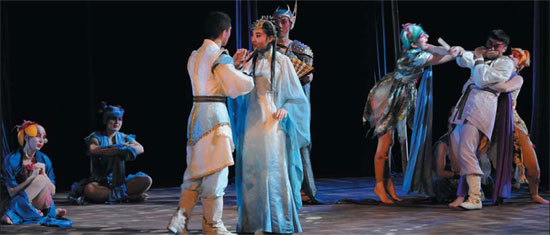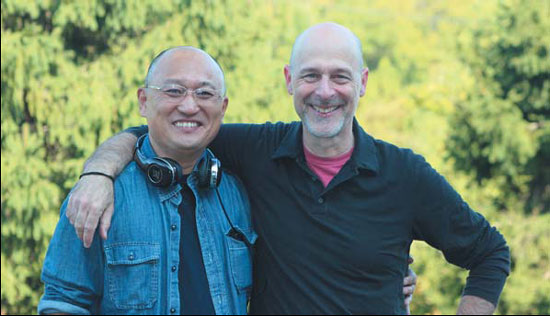Student troupes team up for Midsummer's magic
Updated: 2012-10-05 11:53
By Kelly Chung Dawson in New York (China Daily)
|
||||||||
|
Actors perform a scene from the Maryland-Beijing co-production of Shakespeare's A Midsummer Night's Dream, which will be staged in the Chinese capital this month. Li Bing / For China Daily |
After a four-day run at the University of Maryland, a culture-bridging, bilingual co-production of Shakespeare's A Midsummer Night's Dream will be staged this month at Beijing's National Academy of Chinese Theatre Arts.
Breaking new ground, the play's cast features students from NACTA and the University of Maryland's School of Theatre, Dance and Performance Studies and is the result of a two-year collaboration that involved Skype conferences and personal visits across the Pacific.
Actors will perform in their native language, blending traditional Peking opera, Chinese acrobatics and Western bluegrass music to present a unique take on the popular comedy, said Mitchell Hebert, a professor at Maryland and co-director of the production.
"When we started this project there was absolutely no template for this," he told China Daily. "There was no model for how to do a co-production with another country in a second language. We were making it up!"
Hebert worked with co-director Yu Fanlin, a professor of directing at NACTA, with the help of Maryland professor and costume designer Helen Huang.
"It is really interesting to see two kinds of techniques being used to tell the same story," Yu said in an interview. "The directors, the cast and the crew - all benefited so much from this experience. The joint-production has helped us understand the spirit and technique of both Western dramas and Chinese operas. It provides a chance for mutual understanding and learning, and also has helped establish a profound friendship."
The experience has been "a dream come true", said Anne Warren, interim director of the School of Theatre, Dance and Performance Studies.
"It has been truly interesting to see how both sides have embraced the challenges," she said. "Rather than finding a middle ground where everything simply became the same, this performance highlights and separates those differences and what can be gained from collaborating across cultures."
It was important that the production be more than a cultural experiment, according to Hebert.
"No one wants to sit through a cultural exchange program," he said. "They want to see a play. We didn't want to say, 'Here the Chinese approach and here's the American approach.' It was important to us that it be a cohesive thing."
Huang initiated the co-production while teaching a master class at NACTA in 2010.
"We decided on Shakespeare, because all of his plays are about humanity," she said in an interview. "It doesn't matter what nationality you are; you will relate. And the nature of A Midsummer Night's Dream was perfect, with three different worlds and the separate casts speaking different languages."
Outside the native-language mold will be one American student who studied Chinese before joining the production. Translations are projected on screens during the play. The directors felt that the students would be more likely to act authentically in their own tongue, Hebert said. As a drama professor, he has come into contact with numerous students of English as a second language.
"I asked a few of these students to do a scene in their own language, and it would be revelatory because they would free up immediately." ESL students, he said, "would do scene or monologue, and I would say, 'Can you do that in your own language?'
And they would approximate in their own language and it would be revelatory and they would free up immediately.
"As a performer, you rely on your impulses, and when you're speaking in a second language it's going to take away from the immediacy of the performance. I think that by doing it this way, the audiences will experience the actors' true power," Hebert said.
In fact, in the run at the University of Maryland's Clarice Smith Performing Arts Center last month, audience members often stopped looking at the translation screens, Hebert said.
Bonnie Thornton Dill, dean of the university's College of Arts and Humanities, said the language barriers were less of a challenge than one might expect.
"In watching the performances, you didn't always need language to understand what was going on, and you could see that despite those barriers the performers had really bonded and formed a connection. The opportunities for cultural exchange were far greater than any barrier."
Thornton Dill hopes the upcoming Beijing performances will encourage further dialogue. "While one group might interpret the material one way in terms of their own cultural dynamics and another group might interpret it another way, you can bring them together and have a real dialogue," she said.
"When you identify what two different groups share, you can bring them together and have that exchange."
Julia Klavens, who plays a fairy and serves as assistant choreographer on the production, confirmed that the two groups were able to communicate fairly easily, despite the two languages.
"We are all just college kids - that's what it comes down to," she told China Daily. "Because of the generosity of these students' spirits and our eagerness to learn from them, the pieces really did come together. We found a way to communicate and share. It's funny because you feel like you've become fast friends with them, even though you haven't had a conversation about their families or their lives. It's this innocent, pure bond."
Theatre, Dance and Performance Studies students enrolled in a semester-long survey course on Chinese culture before undertaking the production, Klavens explained
There were minor differences in the way that American and Chinese students had been trained, she said, with the latter less accustomed to joking around during rehearsals, or taking breaks.
"But Yu Fanlin said that one major similarity is that we really get the Chinese sense of humor," she said. "We share a love of slapstick, physical humor, and that unifies us. We laugh at the same things. When someone trips, that's funny in a way that both cultures will always understand."
kdawson@chinadailyusa.com
|
Co-directors Yu Fanlin (left) and Mitchell Hebert worked together over Skype and e-mail on the collaboration between theater students at the University of Maryland and Beijing's NACTA. Adam Nixon / For China Daily |

 Relief reaches isolated village
Relief reaches isolated village
 Rainfall poses new threats to quake-hit region
Rainfall poses new threats to quake-hit region
 Funerals begin for Boston bombing victims
Funerals begin for Boston bombing victims
 Quake takeaway from China's Air Force
Quake takeaway from China's Air Force
 Obama celebrates young inventors at science fair
Obama celebrates young inventors at science fair
 Earth Day marked around the world
Earth Day marked around the world
 Volunteer team helping students find sense of normalcy
Volunteer team helping students find sense of normalcy
 Ethnic groups quick to join rescue efforts
Ethnic groups quick to join rescue efforts
Most Viewed
Editor's Picks

|

|

|

|

|

|
Today's Top News
Health new priority for quake zone
Xi meets US top military officer
Japan's boats driven out of Diaoyu
China mulls online shopping legislation
Bird flu death toll rises to 22
Putin appoints new ambassador to China
Japanese ships blocked from Diaoyu Islands
Inspired by Guan, more Chinese pick up golf
US Weekly

|

|








